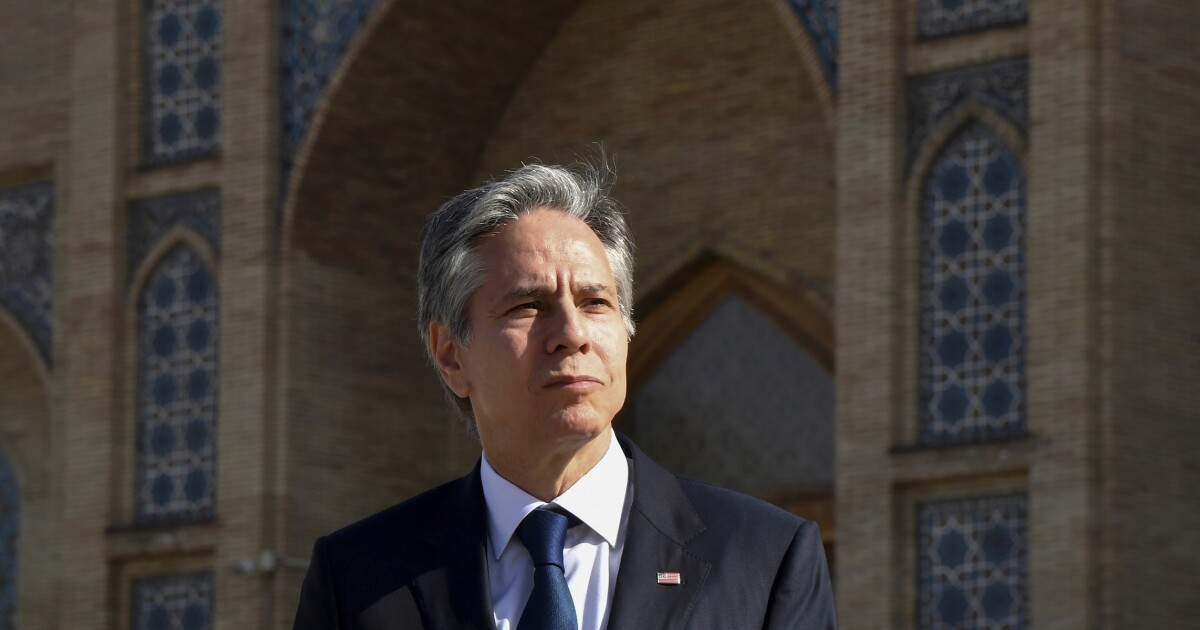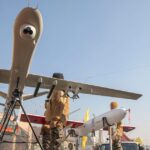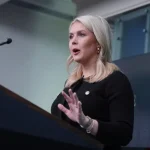

Russia’s former vassals in Central Asia feel “deep concern” about their security due to Russian President Vladimir Putin’s invasion of Ukraine, according to Secretary of State Antony Blinken.
“After all, if a powerful country is willing to try to erase the borders of a sovereign neighbor by force, what’s to stop it from doing the same to others?” Blinken told reporters Wednesday in Uzbekistan. “Countries across Central Asia understand this. So does the United States, and so do partners and allies around the world.”
Central Asian states occupy an uncomfortable place in geopolitics as former Soviet Union satellites vulnerable to Kremlin aggression and also at risk of becoming collateral damage in the Western economic sanctions against Russia. So Blinken, after marking the first anniversary of Putin’s campaign to overthrow the Ukrainian government, embarked on a tour to fortify U.S. economic and linguistic ties to the region.
“Every single day, we’re engaged to build the strongest possible partnerships with all of the Central Asian countries,” Blinken said. “And it starts with our enduring support for their sovereignty, for their independence, for their territorial integrity, and our determination that each be able to determine their own futures consistent with those principles.”
‘ZERO EVIDENCE’ PUTIN IS READY FOR PEACE TALKS, BLINKEN SAYS
Putin launched the full-scale invasion of Ukraine weeks after deploying troops for a “peacekeeping” mission in Kazakhstan perceived by Ukrainians at the time as an operation to flex Kremlin muscle in Central Asia. Yet Kazakhstan and other Central Asian states have proven uncooperative with Russia throughout the war.
“Kazakhstan doesn’t allow them to use its territory for evasion sanctions, but it doesn’t mean that for today we have or feel any threats or risks from Russian Federation,” Kazakh Foreign Minister Mukhtar Tileuberdi said during a press conference on Wednesday.
That judicious comment soft-pedals recent disputes between Moscow and Astana that have surfaced during the war in Ukraine. Kazakh President Kassym-Jomart Tokayev objected to Putin’s backing of “quasi-state entities” in eastern Ukraine during a public meeting with the Kremlin chief in June, and Tileuberdi’s department rebuffed a Russian judge’s attempt to haul Kazakh journalists into court over their coverage of Russia’s withdrawal from Kharkiv.
“The norms of international law state that everyone has the right to freely express opinions; this right includes the freedom to seek, receive and disseminate information and ideas of any kind, regardless of national borders, orally, in writing or by means of print or artistic forms of expression, or by other means of their choice,” the Kazakh Foreign Ministry stated last month, adding that the Russian judge’s order “has no legal force in Kazakhstan.”
Kazakhstan’s distrust for the Kremlin has simmered since 2014, the year Putin initiated the covert phase of the war in Ukraine and said Kazakhstan “never had any statehood” before the collapse of the Soviet Union while his allies made ominous comments about “Russophobic moods” in Kazakhstan. Kazakh leaders responded by threatening to withdraw from the Eurasian Economic Union, the economic bloc that Putin has formed as a rival to the European Union.
“Kazakhstan will not be part of organizations that pose a threat to our independence,” then-President Nursultan Nazarbayev said at the time. ”Our independence is our dearest treasure, which our grandfathers fought for. … First of all, we will never surrender it to someone, and secondly, we will do our best to protect it.”
Putin has justified his predations in Ukraine by accusing Kyiv of persecuting Russian-speaking people in eastern Ukraine, setting an ominous precedent in the minds of Kazakh officials given the ethnic Russian population in Kazakh regions bordering Russia. Blinken, for his part, unveiled an initiative “to increase English language proficiency for more than 1,000 young professionals in government and across civil society” in Central Asia.
CLICK HERE TO READ MORE FROM THE WASHINGTON EXAMINER
“It so happens that at this moment in history — it was different before; I’m sure at some point in the future it’ll be different — but right now, English happens to be the primary currency for international engagement, whether that’s for businesses, whether that’s for governments and diplomacy, whether that’s for people-to-people connections, whether that’s for the internet,” Blinken said Wednesday. “So, that’s just one way in which we’re helping to put countries in a position where they can very effectively diversify their contacts, their connections, their work with other countries.”







